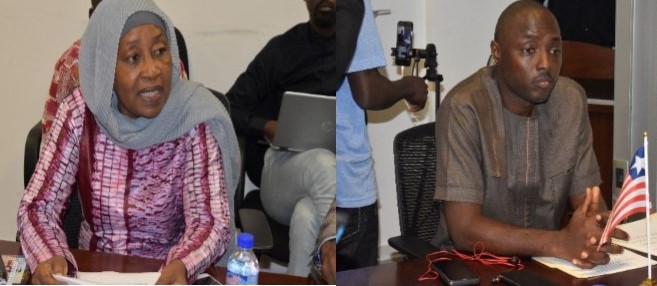-Acting Director General appeals, as FAO pledges continuous support
The official launch ofthe project, the 2009 FAO Agreement on Port State Measures and the Voluntary Guidelines for Securing Sustainable Small-Scale Fisheries for Sustainable Fisheries and Maritime Security in the Gulf of Guinea has taken place in Liberia’s capital, Monrovia.
At the program this week, the National Fisheries and Aquaculture Authority (NaFAA) called on international partners to enable Liberia effectively combat illegal, unreported and unregulated fishing activities across the country.
This project is being implemented in Liberia and neighboring Sierra Leone with a total of 500,0000 for implementation for the period April 2019 –March 31, 2020.
According to a NaFAA press release, the project on the 2009 FAO Agreement on Port State Measures and the Voluntary Guidelines for Securing Sustainable Small-Scale Fisheries for Sustainable Fisheries and Maritime Security in the Gulf of Guinea is aimed at achieving the sustainable development goals 1,2,8,10, 13 and 1; life below water conserve and sustainable use of the oceans, seas and marine resources for the sustainable development, focusing on human interaction with the oceans, seas and marine resources.
Delivering the official statement declaring the start of the project, the Acting Director General of the National Fisheries and Aquaculture Authority called on all fisheries international partners, including the United Nations Food and Agriculture Organization FAO to help enable Liberia effectively and adequately combat illegal, unreported and unregulated fishing activities this he said has caused the country huge lost in revenue.
Acting Director General Augustine M. Manoballah said now is the time that “Liberia needs the collective efforts and support of its international partners to build the requisites capacity needed to combat IUU fishing which has economically crippled the country’s economy, leaving its people in a state of poverty”.
Manoballah stressed that “illegal, unreported and unregulated (IUU) fishing is being associated with national, transnational organized criminal activities and it presents one of the major maritime security issues”.
The Acting Director of the National fisheries and Aquaculture Authority said IUU affects global economy by the loss of USD$ 23 billion annually and one of the most affected regions is West Africa which has lost up to 2,5 billion from 2010 -2016 in six countries including Liberia. Importantly, Mr. Manoballah noted that Liberia loss approximately 70 million during the same period.
He noted that IUU threatens fisheries resources and marine ecosystems and undermines national and regional efforts to manage sustainably and conserve marine biodiversity.
Speaking further Mr. Manoballah indicated that “IUU fishing severely affects coastal and small island developing states that are heavily dependent on fisheries for national economics, employment, people’s livelihoods, food security and the environment”.
Mr. Manoballah recalled that at the “60th session in Rome, Italy November 18-23, 2009, the FAO conference approval the 2009 Agreement on the Port State Measures (the PSMA) to prevent, deter and eliminate IUU fishing, couple with the effective implementation of the complementary international instruments and regional mechanisms, which provides for a potent and cost effective global framework to combat IUU fishing”.
He said Liberia deposited its instrument of accession to the Agreement on Port State Measure (PSMA) to prevent, deter and eliminate illegal unreported and unregulated fishing. He disclosed that the PSMA came into force in Liberia on the 21 June 2019 thus making Liberia the 61st party to have ratified the agreement.
Providing additional historicity on the PSMA agreement, Acting Director General Manoballah said Liberia is the eighth country from the 12 coastal countries of West Africa to have ratified the PSMA, clearly demonstrating the region’s increased commitment and efforts to block fish caught from IUU fishing from being landed at its ports, and reaching national and international markets.
He admitted that Liberia lack the capacity to enforce port state measures and the provision of complementary international instruments and regional mechanisms.
He also said that the proposed intervention will include support to implementation of voluntary guidelines for securing small scale fisheries in the context of food security and poverty eradication for the government, fisheries workers, private sector, civil society organizations among others.
Marking special remarks earlier, the Country Representative of the United Nations Food and Agriculture Organization FAO, Mariatou Njie says her organization “remains committed to working closingly with the government of Liberia and all relevant stakeholders in the agriculture, fisheries and other natural resources sectors for the attainment of its desired development goals”.
Madam Njie said the project is in line with the FAO-Liberia Country programme frame work priority area B; production, productivity and competitiveness.
Commending Liberia for its farsightedness in signing up to the agreement the FAO Representative Madam Njie said despite the effort, Liberia has what she termed as “limited capacity to fully enforce port state measures and the provisions of complementary international and regional mechanisms.
She named the shortcoming in national policies, laws and by-laws, limited institutional and operational capacities, particularly with regard to monitoring, control and surveillance(MCS) system; and poor cooperation and coordination nationally among others as specific capacity gaps.
At the same time, Madam Njie disclosed that the goal of the project is to build the capacity of the governments of Liberia and Sierra Leone to improve sustainability of marine fisheries by preventing, deterring and eliminating illegal, unreported and unregulated IUU fishing and enhance maritime security in the Gulf of Guinea.
Meanwhile, the launch brought together representatives from several government line ministries and agencies and also fisheries organizations including the ministries of National Defense, Commerce, Justice, Agriculture, the National Port Authority, Liberia Maritime Authority, Liberia National police, Liberia Immigration service, National public health Institute, Environmental Protection Agency, Environmental Justice Foundation, Co-management Association and the Liberia Artisanal fishermen Association.

